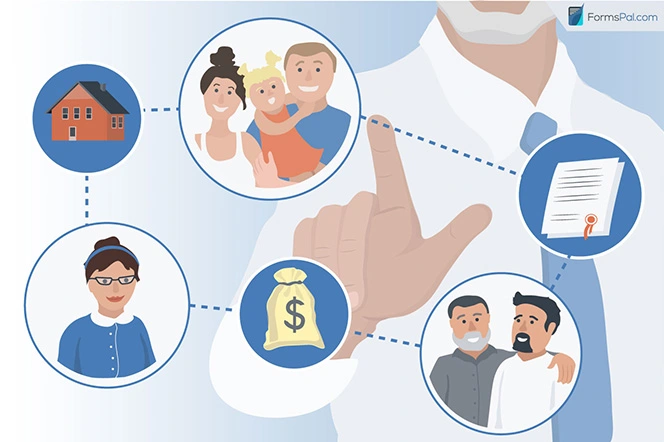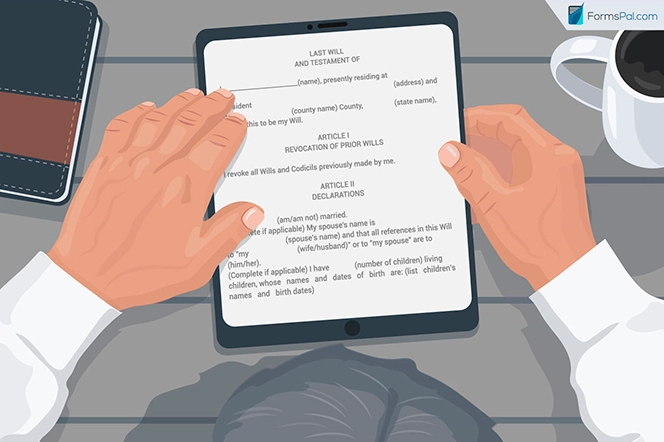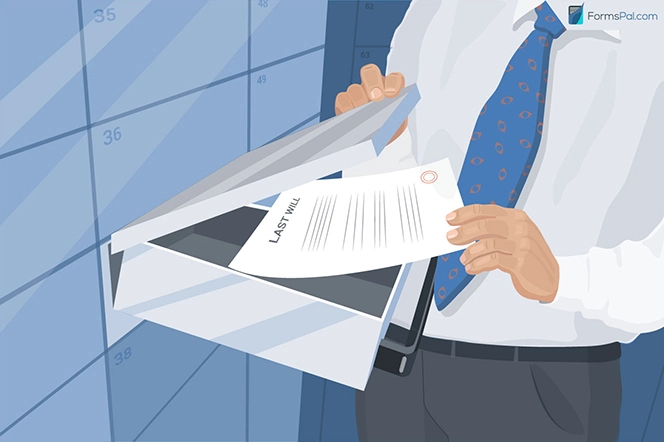What Is a Last Will and Testament?
A last will and testament is a binding legal document that determines how your property will be disbursed after your death. That can be both real property (land, buildings, etc.) and personal property (furniture, jewelry, vehicles, stocks, other savings, etc.), and in today’s digital age, it can even include online assets such as social media accounts, cryptocurrency, or online shopping accounts.
Such property is typically distributed to one’s children or spouse. However, you can also will your wealth to a charitable foundation or any other private organization. Last, you can set aside a portion of your money to cover funeral expenses.
Note that a will does not need to address life insurance. Your insurance will pay out to your insurance beneficiaries as soon as they make a claim.
How to Make a Last Will
It is possible to handwrite the whole document (such wills are called “holographic“), but this approach is generally not recommended. Although they are cheaper, the disadvantages outweigh the benefits. Holographic wills:
-
Are not recognized in some states
-
May contain conflicting provisions
-
Are harder to be located when needed
-
Are usually easier to be contested
Hence, it is better to use our step-by-step builder that will guide you through every possible passage you might want to include.
1. Identify Assets

Go through your property and list what you can dispose of in your last will. That’s an important step because not all of your assets might be subject to disposition.
If you own something jointly, for instance, an apartment, such property will be transferred to the surviving owner automatically. Digital property can sometimes be difficult to dispose of in a will as the law doesn’t have proper regulation regarding such cases yet. And, you won’t be able to bequeath any property that you have already designated to someone in a trust, insurance policy, retirement plan, or stocks.
To avoid the hassle of listing every little small thing you possess, designate someone for a residuary estate (or residue). After listing every major asset, include a residuary estate clause that will name the person getting everything you didn’t list. The person will be called a residuary beneficiary.
Another thing to consider is if you live in a community (or marital) property state. Such states are Arizona, California, Idaho, Louisiana, Nevada, New Mexico, Texas, Washington, and Wisconsin. In those states, half of all assets gained during your marriage will go to your spouse, regardless of what you indicate in your will.
To avoid disputes in the future, before creating a will, review your state’s code and every legal document that can involve your property disposition.
2. Think About People Involved

Below are the main roles you would need to find people for. Even if you’re sure that the person of your choosing won’t mind taking on some of the duties, always ask them to be 100% certain.
Beneficiaries
Think about how you want your previously listed assets to be distributed. Choose the beneficiaries, those who will inherit your property, and what shares they will get. If you want to, you can choose a charity as a beneficiary. Once you make up your mind, you need to decide who gets what. You can divide your assets in percentages, specify which beneficiary gets what piece of property, or mix the two approaches. To make sure the assets can be identified easily, describe them in great detail.
It is a good idea to provide instructions that explain what to do with your assets if the designated beneficiaries pass away before you. For example, you can include a clause that would make such property be distributed evenly among all other beneficiaries or go to charity.
Executor
Choosing an executor requires careful deliberation because this person will be responsible for property distribution and debt settlement per your will’s provisions. Thus, it’s better to choose someone you absolutely trust and, ideally, with a law or business educational background. It is a common practice to choose one person as both the executor and beneficiary. However, if you think there might be quarrels among the inheritors, it might be better to choose a third party for this position.
As a precaution, you can also appoint an alternate executor in case the first one cannot carry out their duties.
Guardian
Indicate a guardian if you have underage children who will need someone to take care of them in case you pass away. You may also name a guardian even if you don’t have any children but plan to have them in the future. Here are some tips:
-
Choose a person younger than you so that they will still be around after your death.
-
Consider your guardian’s residence location if you want your children to grow up in a specific state.
-
Ensure the selected person’s beliefs, education, and lifestyle will create a proper environment for your children.
-
Check if the potential guardian has enough resources for a stable life.
Witnesses
In most cases, you will have to sign the will in the presence of at least two credible witnesses, who will also sign the document. Check your state’s signing requirements to see how many witnesses you would need. You can’t have someone interested in your estate act as a witness.
3. Consider Any Special Wishes

You can add special requests in your last will. For example, you can include a clause regarding the burial procedure or how your remains should be handled. There are many cases known when people leave unusual requests in their wills, like leaving all their estate to their pets. If you have something similar on your mind, make sure it complies with the local laws first.
4. Fill out and Finalize the Form

You can use our step-by-step builder to make sure you don’t miss anything.
You can also consider making your will self-proving if you want to facilitate the probate. To do that, you will need to attach a self-proving affidavit to your will.
IMPORTANT: Self-proving affidavits are not permitted in Louisiana, Maryland, and Ohio. Notarization of the will is required only in Louisiana.
If you still want to add a notary public acknowledgment, it might be better to make your will self-proving as it requires notarization in most cases anyway.
5. Consider Post-creation Measures

Make sure the document is stored in a safe but accessible place. Consider storing your will in a safe or bank deposit box. Another option would be to hand it to an attorney for safekeeping. Write down the information crucial to finding the whereabouts of the will to make sure you or your spouse can locate it if you forget where it is.
You can take another precaution by informing your executor about the will’s location or even providing them with a copy.
How to Change Your Will
Changing your will is the same as creating a new will, including two witness signatures. However, once you’ve changed the will, you’ll want to ensure that the previous will is destroyed along with any copies. For minor changes, you can also create a codicil, which we’ll talk about shortly.
So, why would you want to change your will? There are several life events that are significant enough to merit creating a new will. These include:
-
Getting married
-
Getting a divorce
-
If you’re in a same-sex marriage that was officiated before the 2015 Supreme Court decision
-
Common-law marriage
-
A new domestic partnership
-
The birth of a new baby or an adoption
-
A new stepchild
-
Death of a child, spouse, or other beneficiaries
-
Adding or removing a beneficiary
-
Moving from a common law property state to a community property state, or the other way around
-
A significant change in your estate’s value
-
Changing guardians for your dependents
Frequently Asked Questions
Do I have to create a will?
A person who dies without a will has died “intestate” in legalese. In this case, the law has provisions to distribute your assets. Creating a will allows you to determine what individuals will receive ownership of your funds and under what conditions. Depending on your personal circumstances, this could mean a spouse, parents, children, siblings, or even aunts, uncles, nieces, and nephews.
If you have no living relatives, your entire estate will go to the government. So even if you’re truly alone in this world, you might want to create a will to leave your assets to charity.
What can happen if I don't leave a will?
Depending on your location, the rules on intestate inheritance vary slightly. However, the typical rule is that your closest living relative gets the bulk of your assets. If you’re single and childless, your money will go to your parents if they’re still living. If not, it will go to your siblings. If not, it can go to more distant relatives. The exception to this is if you’re single with children, in which case your estate will go to your children. If any of your children have died before you and left children of their own, your grandchildren will receive their parent’s share.
If you’re married, things get a bit simpler. If you’re married and have children, your entire estate will go to your spouse. The exception is if you have children from any previous spouses, in which case half of your money will go to those children. If you don’t have children, any community property – which means that it’s jointly-owned – will automatically go to your spouse. Your own separate personal property will be divided between your spouse, parents, and siblings, if any are still living.
Things get a bit stickier when you’re in a domestic partnership. If your state recognizes domestic partnerships, the same rules would apply for married couples. If your state does not recognize domestic partnerships, they may get nothing at all, so be certain to check your local laws.
The most devastating effect of an intestate death happens to couples in relationships that are not legally recognized. In that case, in the absence of a will, your surviving partner will receive nothing whatsoever.
What happens if I die in a different state or abroad?
Regardless of where you die, your last will stays legally binding. If you die out of state, the local police will notify your next of kin. If you die overseas, the local police will notify the American embassy, which in turn will notify your next of kin. That said, your next of kin will be responsible for any transportation expenses involved with returning the body.
